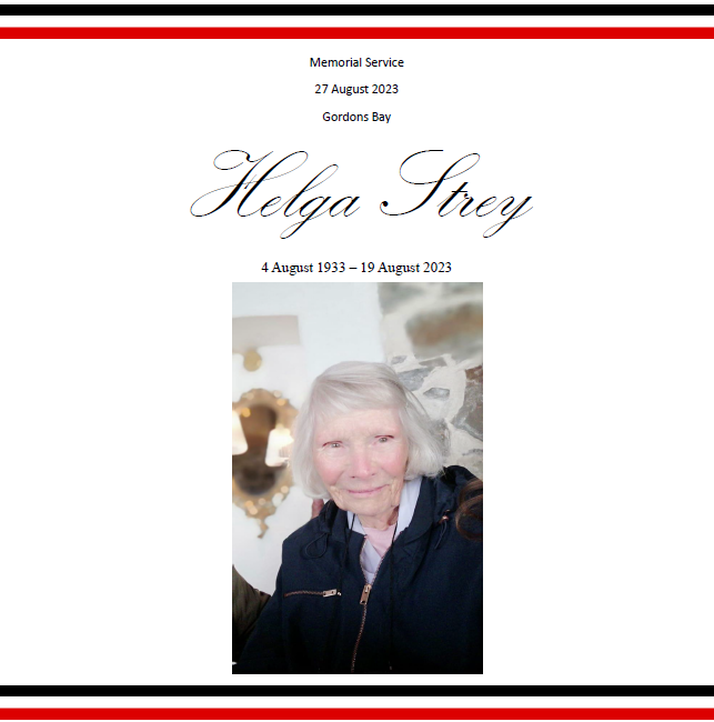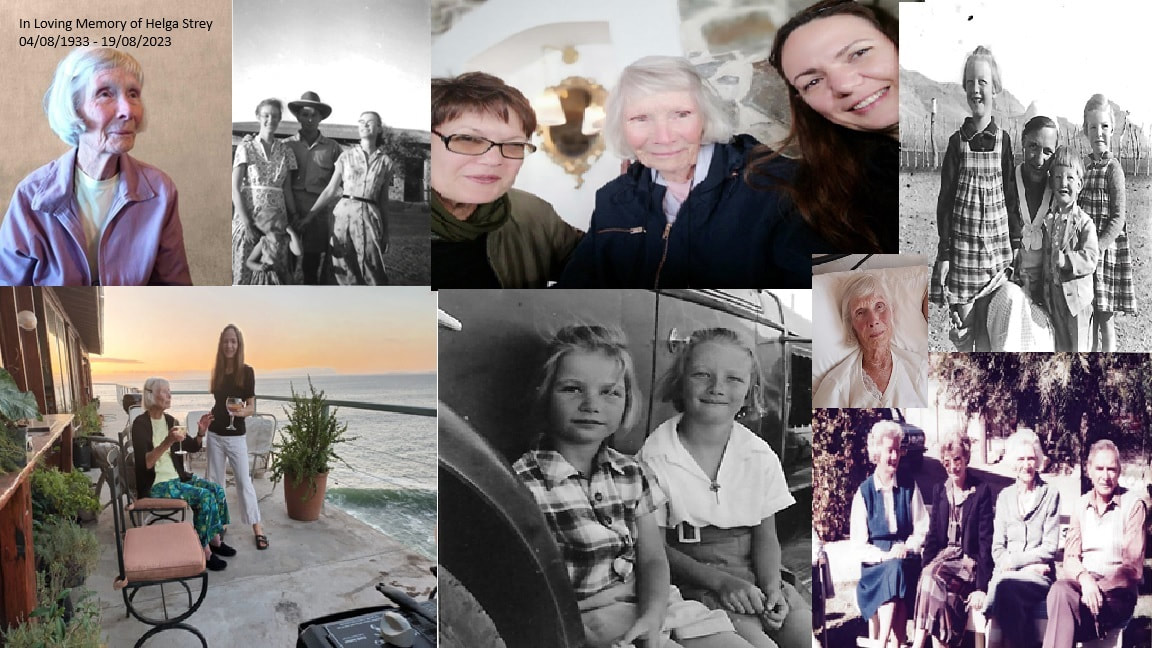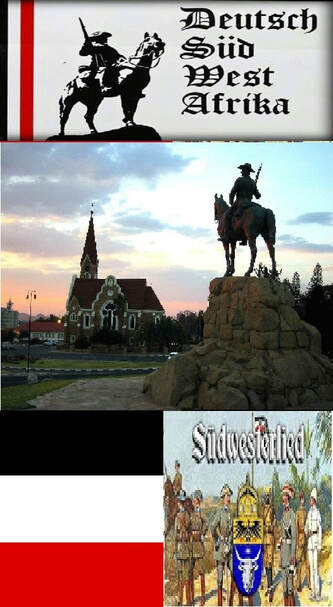 Helga Gertrud Strey was born on 4th August 1933 in Rehoboth, South West Africa, the middle child to Johanna and Rudolf Strey. She grew up with her siblings on Farm ‘Büllsport’ near the Naukluft Mountains South of Windhoek, in South West Africa.During 1936 the family visited the Grandparents (fathers’ parents) in Potsdam, Germany. The family returned to SWA just before the Second World War erupted. As from 1940 Helga and her older sister attended school in Swakopmund where they had to stay in the boarding school hostel for 6 years. At first they attended a German school and later were forced to switch to an English school. In December 1940 their father was taken away to a Concentration Camp along with all German men of “fighting age” and was only allowed to return 6 and 1/2 years later. In the meantime, Helga’s mother managed the farm with her grandmother, aunt and uncle. In 1945 Helga's father was released from the Concentration Camp, but was forced to stay in South Africa for another three months. He started working at the Botanical Institute of Stellenbosch University, so the family joined him in Stellenbosch, where the children continued their schooling. When the parents divorced, her mother stayed on in Stellenbosch until they and finished their schooling. The girls went to Bloemhof Girls High, and the brother went to Paul Ross College. After school, Helga went to Grootte Schuur Hospital in Cape Town to study nursing. During 1957 she returned to South West Africa to help her sister and brother-in-law look after their 3 children, while her sister was in hospital for 3.5 months. Then her brother Rolf came to visit from Northern Rhodesia and Helga went back to Northern Rhodesia (today Zambia) with him. After her holiday in Rhodesia, Helga went to Johannesburg for further studies in the field of Maternity, after which she moved to Lüderitz, SWA, to work. She was then stationed in Windhoek , where she worked for the State and did Community Health work all over South West Africa. She worked as part of an aeronautical Emergency Response team. After 4 years, Helga moved back to South Africa where she lived and worked in Cape Town, Somerset West and surrounding areas. She was the head Matron in the Maternity wards of Springbok, Calvinia and Malmesbury. In 2006, Helga joined the Reformation Society and Livingstone Fellowship, in Rondebosch, where she was involved in research of World History, something she thoroughly enjoyed. During 2020 she moved to Pinelands Place where she continued to stay abreast on current affairs, read voraciously and visit friends, until she ended up spending the final weeks in Gordons Bay. We have a letter Helga wrote to her nieces of her experiences during the war, which gives some good insights to her early life: "My knowledge of WW2 started just before we returned to South West Africa after a year’s visit to our grandparents in Berlin. We left Hamburg by ship via South Hampton in England. However, because of the pre-war atmosphere our German ship Usambara was guided onto a sandbank. (The harbour Captain of the country has to guide a ship in and out of a harbour anywhere in the world, it is practised even today).  It was also Christmas time. After clearing the ship off the sandbar, we sailed onto the Madeira Islands. It was 31 December 1938 and Old Year’s Eve celebration dinner. My sister, me and a child minder had a roaming pillow fight with my 3-year-old brother, your grandfather, Rolf. He thoroughly enjoyed it. The children all received an ‘animal’ gift (I remember one was a giraffe) balloons from the Captain. After Madeira we docked at almost every harbour along the West coast of Africa including: Tenerife (on Canary Islands), Las Palmas, in Senekal, Freetown in Sierra Leone, Accra in Ghana, Sao Tome in Equatorial Africa, Luanda in Angola and Walvis Bay in South West Africa where we disembarked and returned by train to Rehoboth where the person who had looked after our farm, while we were in Germany, fetched us in our truck. Beginning of 1940 my sister Erika and I were taken to Swakopmund to the German Boarding school (where we stayed in the koshuis). The owner and head of the boarding school was very strict. I have no good memory of those 3 years. School was also not much fun. At the end of 1940, back on the farm for Christmas holiday. I still distinctly remember 17 December 1940, a car with 2 detectives arrived, told my parents to pack a suitcase with clothes and toiletries. My father was taken away sitting at the back of an open bakkie, not to be seen again for 6.5 years. He was interrogated and moved around in various detention camps in South Africa, e.g.: ANDAWASA (now a new name), Banaimspoort and Koffiefontein. The reason - he was German and therefore an enemy of the state, whether true or not, they did not ask. His wartime experience was similar to that of most German South Wester men in the country. South West African women and children, i.e., us, were left to fend for ourselves. My mother took over and coped extremely well in difficult circumstances in managing the farm. Petrol, sugar, flour and such like were rationed. My mother was only allowed to bake bread, not cakes! But we secretly sieved the flour enough for a cake, which I loved baking. This was also punishable if caught out. The family had to save up petrol and tires to be able to fetch us 250 miles from the train station and return, for school, after the holidays. The rest of the time it was donkey cart or horse transport to the outposts where rhea sheep were kept.  After 3 years at junior school, we were sent to a much nicer boarding house and senior school – all German. However, school changed in 1946. By order of the Smuts government: The German schools were closed, we had to go to English school. I must mention in Standard 3 at the German school we had English as a 2nd language. Our German teacher was excellent, he gave me such a good grounding that I never had problems or battled with the English language. Back to the farm and school holidays. The first year or two my mother’s youngest sister and her husband stayed with my mother on the farm. Uncle was clever, he built a radio so that we could listen to what was happening in the war, it was all very secretive, because nobody was allowed any radio, or guns, or rifles, etc. If they caught you, you were imprisoned. When someone got ill or had an accident – tough luck, help yourself, or ask the neighbour, or if really serious, the neighbouring farmer would take you to the nearest doctor who was 250 miles away. Everyone was in the same boat. Black farm workers and the whites, everyone helped each other as needed. My grandmother came to stay. Police did inspection rounds unexpectedly to check on all the farms with us early in the war. Grandmother taught us to sew, we had to let out the hems of our dresses, and how to knit and cook. That done, it was play time. My brother and I used to go together, my sister seldom joined us. My mother let a farm worker go with us into the mountains, veld or to the river so that we could explore for the day, of course accompanied by our dogs – always. Terriers with names like Mona, Tinkie, Bessie etc. We each had our own dog, cat, horse and 10 sheep. We farmed with karakul sheep, some cattle and -+ 30 small herd of goats and pigs. During winter break some experienced man was hired to help prepare the food and making various types of typical German polonies and schwaly (pig fat) to be used for frying and on breads, bacon, Kessler ribs, chops etc. It was a hectic few days for all. This meat had to last to the next year during the coldest season. Summer days at school in Swakopmund were wonderful. After lunch we changed into swimming gear and off to the beach and swimming in the sea. I could swim – l learned on the farms water reservoir. The sea was quite rough at times, but we knew how to dive into or under the waves to avoid being tumbled about. Sundays after lunch we often went to climb up and slide down the dunes which were in walking distance of the town, or on long walks along the beach. During the war, all we had were the basic needs. As children, we did not know anything else. No luxuries or fancy things, we learned to improvise, or to do without. There was no official transport. Buses and Taxis were scarce because of petrol rations. We walked everywhere; bicycles were almost unheard of. Petrol came in 40 gallon drums and for our little farm shop supplies came by truck once a month. My mother had a room always open and prepared with bed and water and candle for anyone that got stranded at night, or was too tired or had a broken-down car and needed a place to stay. The person could just come and sleep there without waking anyone up. We never had anyone misusing this hospitality or stealing anything. We always had country workers from Ovamboland i.e., Northern border of South West Africa to do thehousework and mind the sheep. After a day’s work they would always have a head to toe wash and then come to play with us children in front of the house. I guess they missed their families back home. The other farm workers arrived and did the washing and ironing and made soap – as taught by my grandmother. We did not miss anything much as everyone had the same type of life style. Also, we did not know anything else. Eventually the war ended, and my father returned home, it was just before Christmas again! In those days our farms had no electricity and no fridges. The house could not be finished because of the wartime shortages and rationing. There were limited or no materials to be bought. All supplies cane in bags or crates – no cardboard or plastic packaging.” “Love to all, Tante Helga” Helga was a valued founder member of the Reformation Society. Being well read and well-travelled, her contributions during the times of open discussion after Thursday night presentations were always insightful and challenging. Helga was a stalwart member of Livingstone Fellowship every Sunday and we enjoyed discussions with her. She was an independent thinker, with a strong conviction. She did her own independent research and was always willing to challenge the official narrative, especially when it came to big Pharma and medical malpractice. She maintained a healthy lifestyle and was extraordinarily healthy for her age. You can listen to the: Memorial Service sermon for Helga Strey: Heaven is a Real Place https://www.sermonaudio.com/sermoninfo.asp?SID=827231748197908 To view or download the order of service: https://pubhtml5.com/izbev/vtyl/
0 Comments
Leave a Reply. |
Other Tributes...
All
Archives
June 2024
|
"And Jesus came and spoke to them, saying, “All authority has been given to Me in heaven and on earth.
Go therefore and make disciples of all the nations, baptizing them in the name of the Father and of the Son and of the Holy Spirit,
teaching them to observe all things that I have commanded you; and lo, I am with you always, even to the end of the age.” Amen.” Matthew 28: 18-20
Go therefore and make disciples of all the nations, baptizing them in the name of the Father and of the Son and of the Holy Spirit,
teaching them to observe all things that I have commanded you; and lo, I am with you always, even to the end of the age.” Amen.” Matthew 28: 18-20
|
P.O.Box 74 Newlands 7725
Cape Town South Africa |
|
 RSS Feed
RSS Feed
